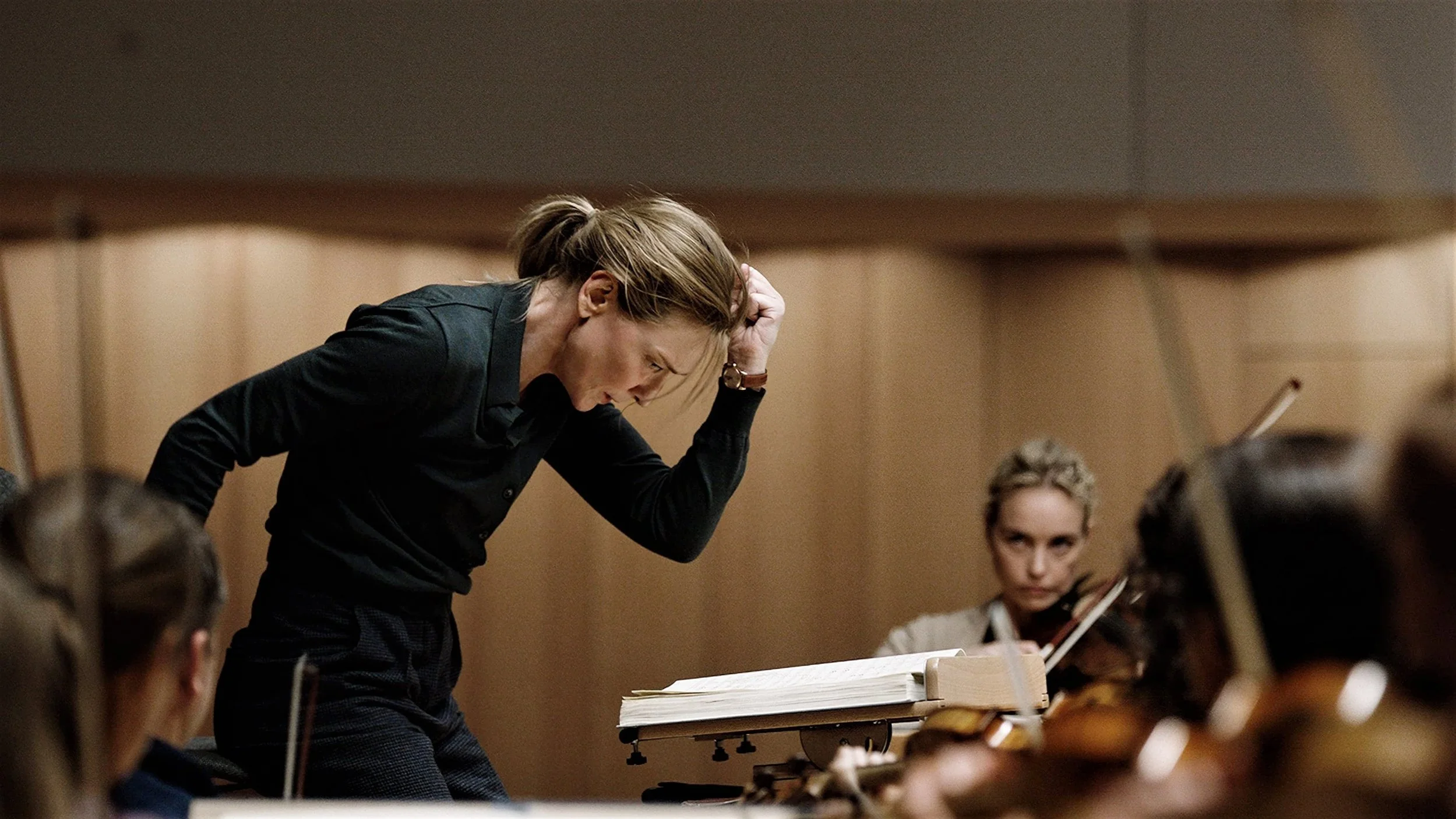Tár
In Todd Field’s immersive study of the elite world of classical music, Cate Blanchett plays a driven maestro with the force of a cyclone.
Not just a human metronome: Cate Blanchett, with Nina Hoss on first violin
Any film that dares to call itself Tár, complete with accent acute, is not going to be your run-of-the-mill piece. In fact, Todd Field’s film – his first in sixteen years – breaks many of the current rules of mainstream cinema. Tár opens with a texting session on a mobile phone before cutting to a black screen, on which we hear a voice softly speaking in English, and then Thai, barely audible. And then the full credits unfold, white on black, set to a haunting female voice. Tár can hardly be said to start with a bang. But its very unworldliness and uniqueness casts a distinctive spell. After the credits, the camera rests on the face of the world-class conductor Lydia Tár (Cate Blanchett) for a full fifty seconds as she composes herself, backstage, for yet another performance in front of an audience. However, this time she is not going to conduct an orchestra, but is to be conducted herself in an on-stage interview by Adam Gopnik of The New Yorker (playing himself). This is a neat way of laying down the biographical facts, without reverting to clumsy, implausible exposition. And so we learn that Lydia Tár is a Harvard graduate, has conducted the New York Philharmonic, the Boston Symphony and is currently leading the Berlin Philharmonic. She has also won a Grammy, a Tony, an Oscar and an Emmy and was mentored by none other than Leonard Bernstein. So, we now know all about Lydia Tár, at least the professional highlights, if not the private downsides. Maestro – let the interview commence…
Much praise has already been heaped on the shoulders of Cate Blanchett as Lydia, so when we see her on stage answering the questions of Adam Gopnik, it is a shock to see how stilted her performance is, how pretentious she comes across. But of course, Ms Blanchett is already one step ahead of us as she’s playing a narcissist at the top of her tree, a ferocious intellect who uses the English language like a bulletproof vest. In a later scene, where she’s teaching a masterclass at Juilliard, she turns on a student for his distaste of Bach for being a white misogynist: “Don’t be so eager to be offended,” she says, “the narcissism of small differences leads to the most boring people.” Both Lydia and Blanchett have access to sharpened tools, with the former sweeping all before her as she dashes from New York to Berlin, spreading her charisma and intellect like confetti. She has earned the vertiginous perch in her ivory tower and wallows in the spiritual elitism of classical music. Under Todd Field’s direction (he also produced and scripted), Lydia’s world is a mesmerizing Utopia. Likewise, Blanchett gives the film her all, not only conducting from the podium, but following Lydia’s punishing fitness regimen of running and boxing, speaking fluent German and playing the piano. Indeed, the piano on virtually every classical piece in the film is credited to Cate Blanchett. What a performance.
What distinguishes Tár from other films is the comfort it feels in its own skin, the reliance on the singular features of Ms Blanchett, the leisure it takes in soaking in a specific scene and a refusal to kowtow to the lowest common denominator of conventional narrative. At one point, Lydia emerges with a face cut and bruised from an apparent (and mysterious) “attack”, a key moment we are denied the schadenfreude of witnessing. Likewise, Lydia’s global trips are never captioned, leading to a sense of giddy disorientation, probably in keeping with our protagonist’s emotional equilibrium. If Lydia Tár comes across as charming and unassailable, nano moments of inconsiderate behaviour, of manipulation, of insensitivity, start to build up a very different picture of this model of artistic perfection. And whereas the cultural icons of yore proved untouchable, such invincibility is no longer a possibility. Of course, Tár will not be to everybody’s taste and to truly appreciate it one needs to succumb to its singular world on its own terms. Yes, it is 158 minutes long, but by the final curtain it doesn’t feel long enough.
JAMES CAMERON-WILSON
Cast: Cate Blanchett, Noémie Merlant, Nina Hoss, Sophie Kauer, Julian Glover, Allan Corduner, Mark Strong, Sylvia Flote, Adam Gopnik, Mila Bogojevic, Fabian Dirr, Zethphan Smith-Gneist, Sydney Lemmon, Alma Löhr, Alec Baldwin.
Dir Todd Field, Pro Todd Field, Alexandra Milchan and Scott Lambert, Ex Pro Cate Blanchett, Screenplay Todd Field, Ph Florian Hoffmeister, Pro Des Marco Bittner Rosser, Ed Monika Willi, Music Hildur Guðnadóttir, Costumes Bina Daigeler, Sound Roland Winke, Dialect coaches Francie Brown, Inna Resner, Franziska Roth and Helen Jane Simmons.
Standard Film Company/EMJAG Productions-Universal Pictures.
158 mins. USA/Germany. 2022. US Rel: 28 October 2022. UK Rel: 13 January 2023. Cert. 15.


